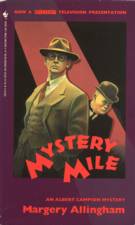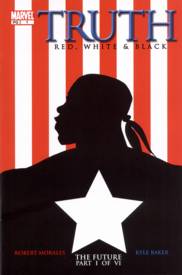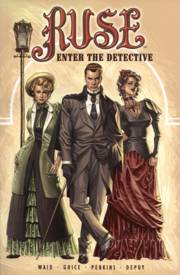






|
Bookshelf:Recently Reviewed: Currently Reading: Next Up:
|
Truth and Ruse
How about some comics reviews?
Two issues have been published so far. It is by no stretch of the imagination a good comic book. Written by Robert Morales, the first issue introduces several "ordinary joe" black men in the days surrounding Pearl Harbor. All the victims of racism in some form or other, they all end up in the army for one reason or another. The second issue follows their life in the barracks for a short while, until their camp is broken up for some new, hush-hush project. Yes, folks, it takes two full issues of the comic just to get to the point that the premise is being introduced. If there was a story crying out to be started in medias res, this is it, as the first two issues run the gamut from deadly dull to chokingly cliched. A couple of newlyweds encounter blatant discrimination at an amusement park. The black scion of a well-to-do family is beaten. A black army officer is put "in his place" by his superiors. It's weak, one-dimensional stuff. While there's perhaps some social value in the repetition of such yarns, this sort of by-the-numbers retelling adds nothing to my life. Then there's the artwork of the redoubtable Kyle Baker. I was first introduced to Baker through his subtle and unique inking style on some Marvel titles in the 1980s, and although he has a flair for broad layouts when pencilling, the art in The Truth leans entirely to the latter end and shows absolutely none of the former. Cartoony, heavy-handed, devoid of even a smidgen of nuance, this is easily the least interesting artwork I've ever seen from Baker. Unlike his earlier work, there isn't anything here to go back and admire; it's just plain bland. Marvel clearly wanted a best-seller with some controversy attached to it here, but even a serious and grim conspiracy story would be preferable to this trifle of a tale. Stay far away from this one at all costs; I certainly have no interest in continuing past the second issue.

I recently gave my first Crossgen title a try, picking up the trade paperback collection of Ruse, collecting issues #1-6. It's not bad. Kind of wobbly, but not bad. Simon Archard is a Sherlock Holmes type plying his detective trade in the city of Partington, apparently a sort of alternate-world Victorian-age London. Whereas Holmes was simply focused and brusque, Archard is actively insensitive, and yet highly trusted by the city he serves. His assistant (partner, she insists) is Emma Bishop, who seems to have the power to stop time, but who is also either working for or competing with some mysterious other power. Her charge seems to be to humanize Archard without actually using her abilities. All of this is revealed in issue #1, and then near-silence on this point for the next 12 issues (I've picked up copies through #13; I believe #15 is the latest issue). Ruse is oddly named; Emma seems to be conducting a ruse, disguising her true identity (maybe) from Archard, though this element is so downplayed by the story it's hard to credit that it's the reason for the title. Archard performs the occasional ruse on his opponents, but no more so than Holmes ever did. So why the title? And, for that matter, why the city of Partington, and the not-quite-Earth-but-close feel to the milieu? Why not just put it in London - even a slightly fantastic one - and leave it at that? It seems like pointless window-dressing, and wondering whether there's any point to it distracts me from the stories. The stories themselves are pretty good. The first four issues involve a foreign visitor to Partington who manages to turn the city against Archard, forcing him to take extraordinary measures to counter her efforts. She seems to have some knowledge of Emma's true nature, as well. Following this, the book launches into an 8-issue arc where Emma investigates Archard's past, in particular his relationship with his former partner, Lightbourne, who it appears may not be as dead as reports had indicated. Emma is clearly the centerpiece of the series, which is written through #12 by fan favorite Mark Waid, as she's the only character with enough screen time and enough sympathy for us to care about her. Archard is too much of a hard case, and no one else gets much time on the page. And yet for all of Emma's Watson-like endearing qualities, her true nature is lurking beneath the surface, frustrating the reader by never revealing even a little about who she is and why she's really there. Ultimately, Waid's approach of focusing relentlessly on the plots is what weakens the book. There's an unending hint of texture, but we never really get to the meat of it. Alternate reality, Emma's secrets, or what-have-you, I'm often wishing that the book would just drop the whole Lightbourne thing and get to one of those. (I have this theory that Partington and its world might be some sort of fabrication, an imaginary place into which Emma has been placed from her own world for some reason, either to test the fabricator, or to test Emma. We'll see - maybe.) The artist is Jackson "Butch" Guice, who's developed a tremendous facility for poses and expressions, even though the dynamism of his early career (e.g., on Micronauts) has largely faded. His scene and character designs are sumptuous and almost make the price of admission worthwhile on their own. Ruse is entertaining enough that I expect I'll keep following it for a while, but I'm going to expect some larger payoffs before too long if my interest is to be held. And in any event it's certainly not enough to persuade me to check out any further Crossgen titles.
|
||
 The Truth is Marvel's latest much-hyped mini-series (in the wake of the popular - if mediocre - origin of Wolverine, creatively titled Origin). The premise of this 6-issue mini-series is that prior to creating Captain America during World War II, the Super-Soldier project first experimented on some black men. This is their story, a story of bigotry and social oppression.
The Truth is Marvel's latest much-hyped mini-series (in the wake of the popular - if mediocre - origin of Wolverine, creatively titled Origin). The premise of this 6-issue mini-series is that prior to creating Captain America during World War II, the Super-Soldier project first experimented on some black men. This is their story, a story of bigotry and social oppression. I've generally kept away from the line of books published by Crossgen Entertainment so far, simply because none of them have sounded especially interesting. Space-fantasy, young adult adventure, and so forth, often with creators who have never particularly excited me attached to them. Well-funded by founder Mark Alessi, they seem to have become fairly popular.
I've generally kept away from the line of books published by Crossgen Entertainment so far, simply because none of them have sounded especially interesting. Space-fantasy, young adult adventure, and so forth, often with creators who have never particularly excited me attached to them. Well-funded by founder Mark Alessi, they seem to have become fairly popular.